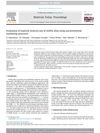Finasteride: Not Guilty After All?
October 2006
in “
The Lancet Oncology
”
TLDR Finasteride reduces prostate cancer risk but may increase aggressive cancer risk slightly.
The 2003 trial of the 5α-reductase inhibitor finasteride demonstrated a nearly 25% reduction in prostate cancer risk compared to a placebo. However, this benefit was overshadowed by a 1.3% increase in the incidence of aggressive, high-grade prostate cancer among users. These mixed results led to a tempered enthusiasm for the drug despite its potential in reducing overall prostate cancer risk.


